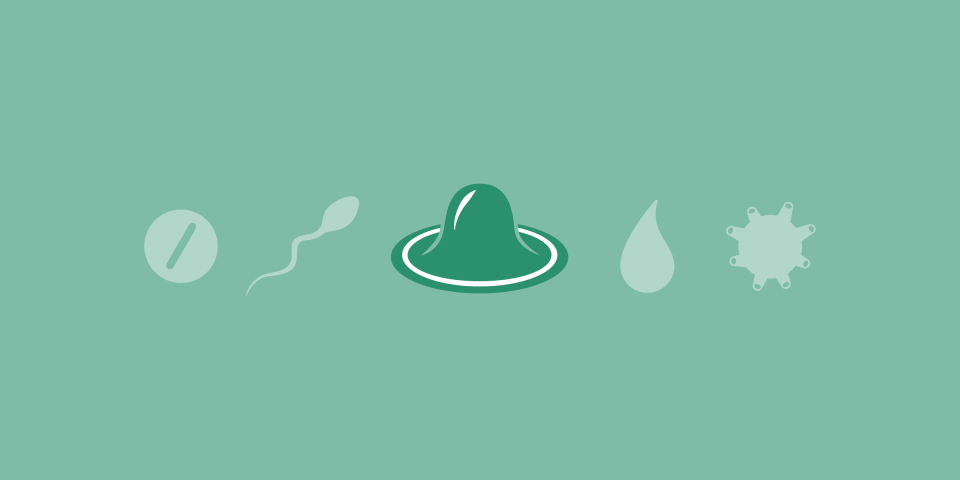Do I need to use a condom for oral or anal sex?
Yes, if you want to be protected against STIs. Sexually transmitted infections, including HIV, syphilis, herpes, gonorrhoea, HPV, trichomoniasis, and chlamydia, can all be passed on during oral sex (10). This is why it's recommended to protect yourself and your partner by using condoms (or dental dams) during oral sexual activity. Flavored condoms are available for those who don’t enjoy the taste of latex.
Meanwhile, a US study found that when condoms were used for anal sex with an HIV-positive partner, they were 70% effective in preventing transmission of the virus (11). Using a personal lubricant can also make anal sex safer. Using a silicone or water-based lubricant decreases the chances of condom breakage while having anal sex, in contrast to oil-based lubricants, saliva, or no additional lubricant at all, which all increase the chances of condom breakage (12).
Do I need to use condoms if I’m on the pill? What if I’m in a monogamous relationship?
If you want to be protected from STIs, then yes. The pill doesn't protect you or your partner from STIs, but condoms do. Also, if you forget to take a pill or have been vomiting for any reason (e.g. illness), the effectiveness of the pill is lower and you could still get pregnant. If you track taking your pill in Clue, the app will let you know what to do if you miss a dose, including when you need to use back-up protection—like condoms.
A monogamous relationship won’t automatically protect you from STIs, or pregnancy. Anyone can get a sexually transmitted infection, sometimes even without noticeable symptoms. Although some STIs produce discharge or other visible signs, it’s not always possible to tell by looking at someone if they have an STI.
I don’t have any sex involving a penis. Do I still need condoms?
No penis, no problem? Not quite. If you’re sharing sex toys, then covering them with condoms is a good way to prevent the development of bacterial vaginosis (BV) or transmission of STIs. Remember to change the condom each time you change partners, or when you change from anal to vaginal use.
Do I need to use condoms during my period?
Yes. It’s still possible to get pregnant during your period, although the day-specific risk is variable and depends on your cycle, age, and health. Clue’s 2018 study with the Kinsey Institute’s Condom Use Research Team found that condoms are used less often (15% less) during menstruation. This is important because rates of STI transmission and acquisition are higher at certain times of the menstrual cycle—including during menstruation. Using a condom for period sex can prevent pregnancy and protect against STI transmission.
Does it matter which lubricant I use?
Yes. The best lubricant for vaginal or anal sex with a condom is water-based or silicone-based lube. Oil-based lubes (or any other oil products like petroleum jelly or mineral oil) should not be used with latex condoms, as they may cause them to break (13). Plus, sex with lube feels good! In a 2013 study, most women reported that lube made sex feel “more comfortable,” “more pleasurable,” and simply “better” (14). Many non-latex condoms (like those made of polyisoprene) are also sensitive to oil-based personal lubricants, so check the package (15).
Is it better to use two condoms instead of one?
No. One condom used correctly is all the protection you need. If you put two condoms on at once, there's a higher chance of condom breakage. This also applies if you use a condom worn on the penis together with an internal female condom. Best to stick to one condom, and use some condom-safe lubricant.
Can I still use condoms if I’m allergic to latex?
Yes. A latex allergy doesn’t mean you need to stop having sex, or that the only option is unprotected sex. Many different non-latex condoms are available: made of lambskin, polyurethane and polyisoprene, AT-10 synthetic resin or synthetic nitrile rubber. These can be used in the same way as a latex condom, although lambskin condoms do not protect against STIs. Internal or “female” condoms are often made of polyurethane or nitrile, which is safe to use for people who are allergic to latex. Another benefit to polyurethane or nitrile internal condoms is that they can be used with all types of lubricants (including oil-based lubricants) (16,17).
What should I do if the condom breaks?
If you feel the condom break at any point during sexual activity, stop immediately, withdraw, remove the broken condom, and put on a new condom. If a condom breaks and you're not using any other contraception, go to a clinic, pharmacist or doctor as soon as possible and ask about emergency contraception. You may also need to get tested for STIs.
Let’s wrap this up:
Now you know more about condoms, you can decide what level of risk is okay for you, and choose what kind of contraception or protection to use. Remember that only condoms can protect you against both pregnancy and sexually transmitted infections (STIs). The safest option is to use condoms and another form of birth control. If you're taking the pill, you can track in Clue and get personalized advice on what to do if you miss a pill.
If after reading this you're worried you might be pregnant, check out our guide to emergency contraception, advice about what to do if your period is late, and information on the symptoms of early pregnancy.

